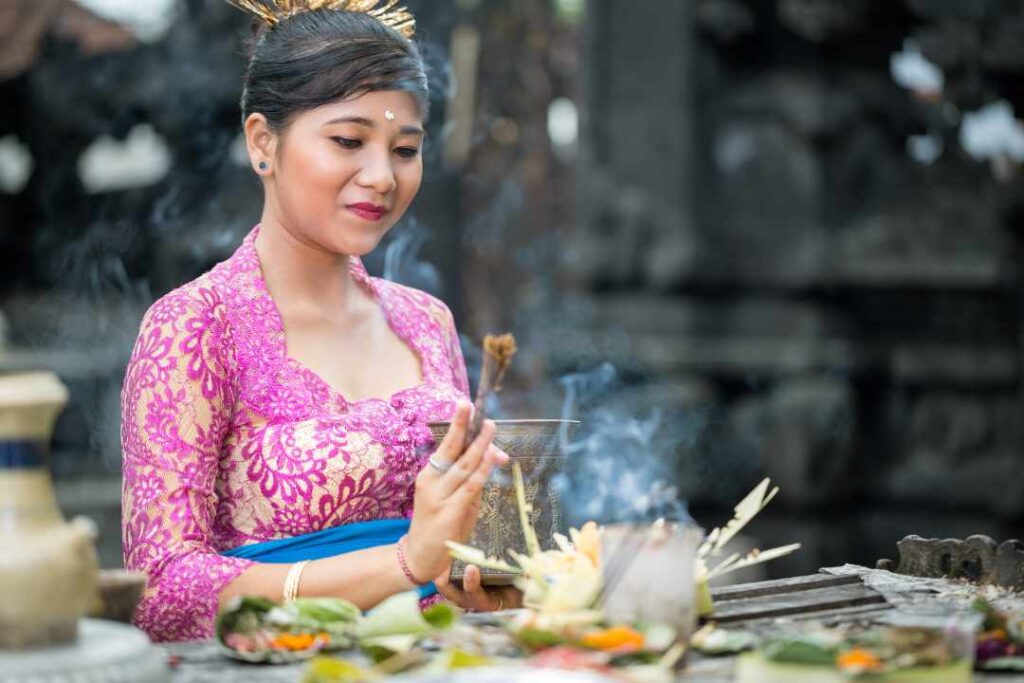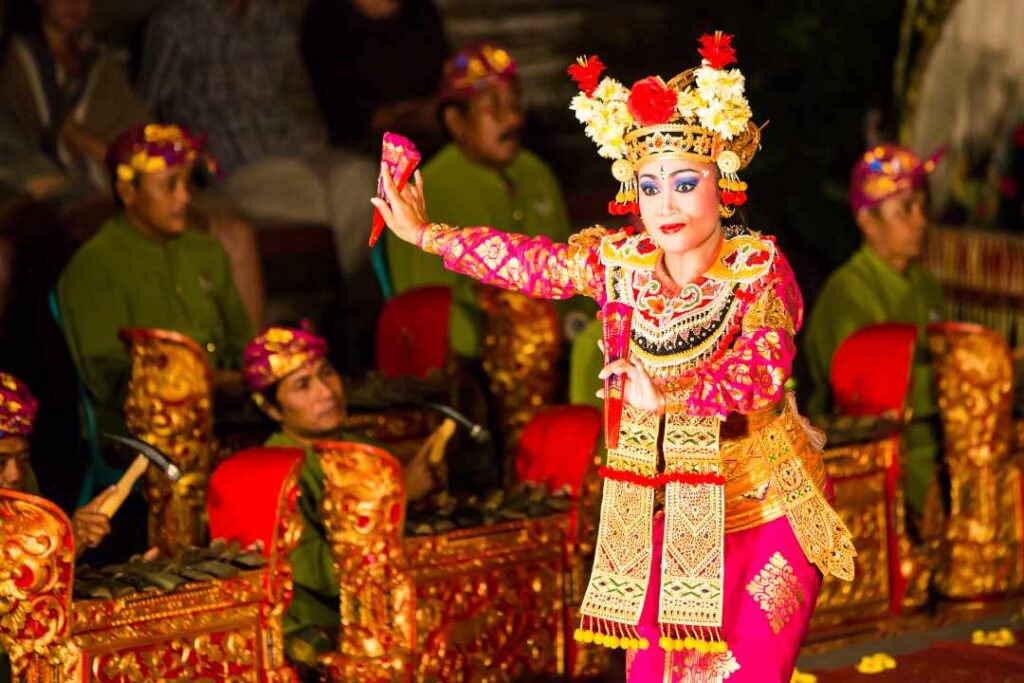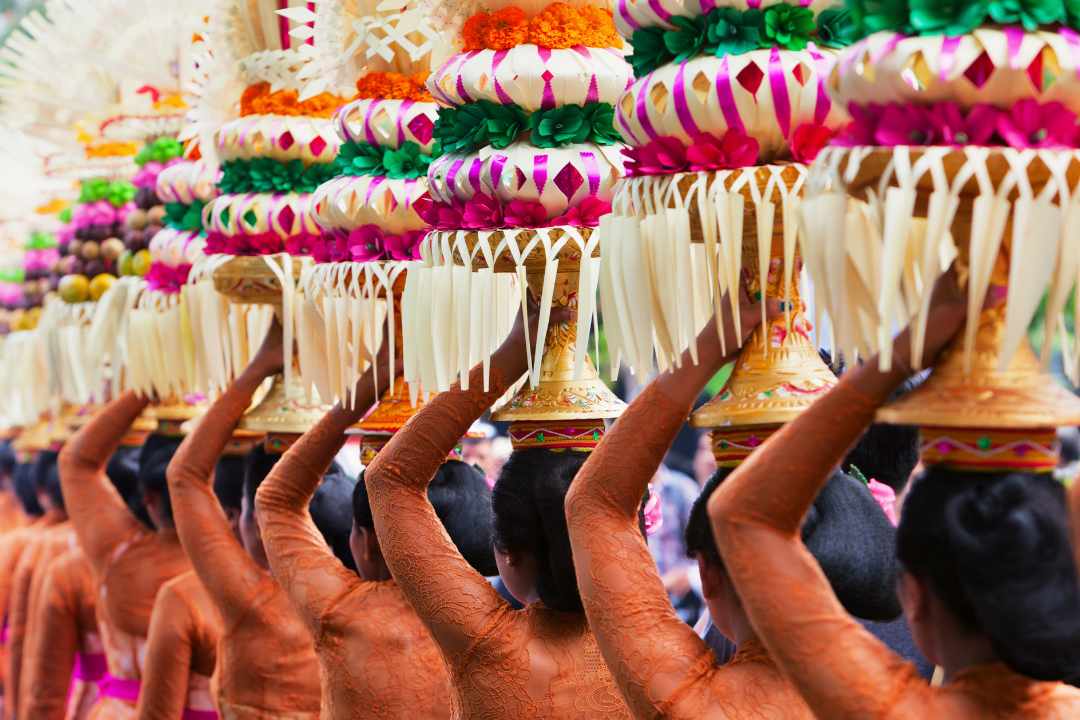Bali cultural events are more than performances or ceremonies. They are living traditions that reflect the island’s deep spirituality, community values, and artistic beauty. From sacred rituals to global festivals, these events connect travelers to Balinese cultural heritage in meaningful ways. Attending them is not just about watching; it is about experiencing how tradition, faith, and creativity shape everyday life on the island.
Major Religious & Bali Cultural Events
Nyepi: Bali’s Day of Silence
Nyepi marks the Balinese New Year and is one of the most unique traditional celebrations in Bali. Unlike most New Year festivities around the world, Nyepi is a day of silence, meditation, and reflection. The island shuts down completely. Shops, restaurants, and even the airport close for 24 hours. Streets stay empty, and the night sky shines without light pollution.
The night before Nyepi, colorful Ogoh-Ogoh parades take place in villages. Locals carry giant paper-mâché effigies representing negative spirits. These are burned after the parade to cleanse the island of evil. The contrast between the loud celebrations and the next day’s complete silence makes Nyepi one of the most powerful Bali cultural events.
Galungan & Kuningan: Victory of Dharma
Galungan and Kuningan celebrate the triumph of dharma (good) over adharma (evil). These ceremonies last for 10 days and take place every 210 days according to the Balinese calendar. Villages fill with decorations called penjor, tall bamboo poles with woven coconut leaves, flowers, and fruits.
Families prepare offerings and visit temples dressed in ceremonial clothing. Kuningan marks the end of the celebrations, believed to be the day when ancestral spirits return to heaven. For visitors, Galungan is a chance to see how Balinese cultural heritage blends family devotion with artistic beauty.

Artistic Bali Cultural Events and Performances
Bali Arts Festival: A Month of Creativity
The Bali Arts Festival, or Pesta Kesenian Bali, is one of the island’s largest cultural events. Held annually from mid-June to mid-July at the Taman Werdhi Budaya Art Centre in Denpasar, it attracts thousands of performers and visitors.
The festival opens with a huge parade in Denpasar, featuring traditional dancers, musicians, and elaborate costumes. Over the next month, daily performances showcase classical and modern Balinese arts. Visitors can enjoy traditional dances, gamelan music, puppet shows, and exhibitions of crafts, fashion, and food. The Bali Arts Festival is more than entertainment. It is a celebration of Balinese cultural heritage, keeping traditions alive for the next generation.
Bali Kite Festival: Tradition in the Skies
Kite flying is an old Balinese tradition linked to gratitude for a good harvest. Villages across the island host kite festivals, often in rice fields. Moreover, the Bali Kite Festival in Sanur is the most famous and takes place every July.
Teams compete to build the biggest and most creative kites, some reaching up to 10 meters long. Flying them requires teamwork, skill, and strength. The event is both competitive and communal, as villages gather to showcase their artistry. For visitors, this is one of the most unique Bali cultural events because it blends fun with ancient tradition.
Unique and Lesser-Known Bali Cultural Events
Omed-Omedan: The Kissing Ritual
Omed-Omedan, also known as the “kissing ritual,” happens the day after Nyepi in Sesetan, Denpasar. Young unmarried men and women gather in two groups and face each other. When the signal is given, they move forward, embrace, and sometimes kiss while onlookers cheer.
Water is splashed on the participants to cool down the excitement. Locals believe the ritual brings good luck and keeps the community safe. While playful on the surface, Omed-Omedan reflects Balinese beliefs about unity, harmony, and renewal.
Mekotek: A Ritual of Unity
Mekotek takes place in Munggu village, Badung, during the Galungan festival. Villagers carry long wooden poles and gather in the street. Groups of men join their poles together to form tall towers, climbing and balancing on them.
The ritual is a symbol of courage and unity. It is also believed to protect the village from misfortune. For travelers, Mekotek is one of the lesser-known traditional celebrations in Bali, but it offers an authentic glimpse into community spirit.
Perang Pandan: Ritual Battle in Tenganan
Perang Pandan, also called Mekare-Kare, is a ritual held in the traditional village of Tenganan. Men engage in mock battles using thorny pandan leaves as weapons and rattan shields for protection.
The ritual honors the god Indra, the deity of war. While it may look fierce, the battles are followed by healing rituals and communal feasts. Visitors can witness this unique tradition as part of Bali’s living heritage.
Literary & Spiritual Events in Bali
Ubud Writers & Readers Festival
The Ubud Writers & Readers Festival is Southeast Asia’s leading literary event. Writers, poets, and thinkers from around the world gather in Ubud to share ideas and celebrate storytelling. Further, the program includes panel discussions, workshops, book launches, and cultural performances.
Set in Bali’s cultural heart, the festival highlights the island’s role as a meeting place for creativity and knowledge. It is not only for writers but also for students, travelers, and anyone who wants to explore culture through words.
Bali Spirit Festival: Music and Wellness
The Bali Spirit Festival is a spiritual and cultural event that combines yoga, dance, music, and healing practices. Held in Ubud, it attracts participants from all over the world. Moreover, the event offers workshops, performances, and wellness programs that promote harmony and mindfulness.
This festival reflects another side of Balinese cultural heritage, one that blends traditional wisdom with global ideas. For many, it is a transformative experience that goes beyond tourism.
Community-Based Bali Cultural Events
Sanur Village Festival: Culture by the Beach
The Sanur Village Festival brings together culture, food, music, and community activities on Sanur Beach. Further, the program includes yoga, culinary fairs, art exhibitions, and water sports.
This event reflects how traditional celebrations in Bali evolve with modern influences while still maintaining their cultural roots. It also shows how communities use festivals to promote tourism and preserve local traditions.
Seraya Culture Festival: Preserving Local Identity
In East Bali, the Seraya Culture Festival revives forgotten traditions through dance, crafts, and local food. By highlighting heritage, this festival also plays a role in keeping Balinese cultural heritage alive for younger generations.

Tips for Experiencing Bali Cultural Events
Attending cultural events in Bali is a privilege, and respect is key.
- Dress modestly, especially for temple ceremonies.
- Do not disturb offerings or walk in front of processions.
- Follow the lead of locals when entering sacred spaces.
- Always ask before taking photos, especially during rituals.
By showing respect, visitors not only enjoy the events but also support the preservation of Balinese cultural heritage.
Conclusion
Bali cultural events are living traditions that showcase the island’s heart and soul. From sacred rituals like Nyepi and Galungan to creative celebrations like the Bali Arts Festival, each event offers a different window into Balinese cultural heritage. They are not only ceremonies but also moments of connection—between people, traditions, and generations.
For visitors, experiencing these events is more than sightseeing. It is a way to understand the values, beliefs, and artistic spirit that make Bali unique. Whether you join a village festival, watch a kite soar above rice fields, or listen to stories in Ubud, you become part of a tradition that continues to thrive.


[…] joining the Melukat ritual, visitors not only experience a unique cultural event but also connect spiritually with Balinese tradition. It is both cleansing and deeply moving, […]